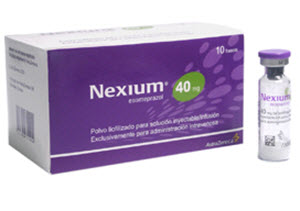 Type: PPI
Type: PPI
Active ingredient: Esomeprazole magnesium
Common use: Nexium is a proton pump inhibitor (PPI) chiefly used to treat heartburn or gastroesophageal reflux (acid reflux). When combined with antibiotics, Nexium can be used in the treatment of Helicobacter pylori (H. pylori) infection and duodenal ulcers.
How to use: Follow the directions from your doctor, since treatment recommendations vary depending on a variety of factors. With that said, it is common to take Nexium with a full glass of water (circa 250 ml) at least one hour before a meal. Nexium tablets and capsules should ideally be swallowed whole, since breaking them, chewing them or opening them can increase the risk of side-effects.
If you miss a dose of Nexium, take it as soon as possible. If it is almost time to take your next dose, skip the missed dose permanently and stick to your regular dosing schedule. Do no take two doses at once or near each other in time.
How to store: Store Nexium tablets at room temperature in a tightly-closed container, and keep away from heat, light and moisture. If your Nexium isn’t in the form of tablets, follow the storage instructions on the label.
Warnings:
- Inform your doctor about your health history, current health situation and any medical treatments. It is especially important to inform your doctor about liver problems, high blood pressure or difficulties swallowing.
- Do not take any prescription medicines, over-the-counter medicines or dietary supplements without consulting your doctor first. They may be unsuitable to combine with Nexium, or there might be recommendations to follow about how many hours apart from Nexium they need to be taken.Examples of medicines that are especially important to discuss with your doctor are Cilostazol, Diazepam, Digoxin, Intraconazole, Ketaconazole, Sucralfate, and supplements that contain iron.
- Discuss the benefits and risks of using Nexium during pregnancy with your doctor.
- Discuss the benefits and risks of breastfeeding while using Nexium with your doctor.
- Seek immediate medical attention if you experience throat pain, easy bruising, easy bleeding, severe stomach pain, chest pain, loss of appetite, or vomits that looks like coffee-grounds.
- Seek immediate medical attention if you develop symptoms of an allergic reaction to Nexium, such as rash, hives, dizziness, tightness of chest, difficulties breathing, swollen face, swollen eyelids, swollen lips, swollen tongue, or swollen throat.
Examples of reported side-effects:
- Diarrhea
- Constipation
- Nausea
- Flatulence
- Headache
- Cough
- Dry mouth
